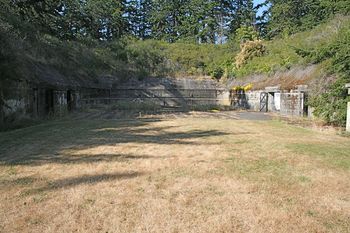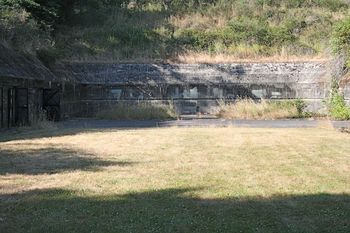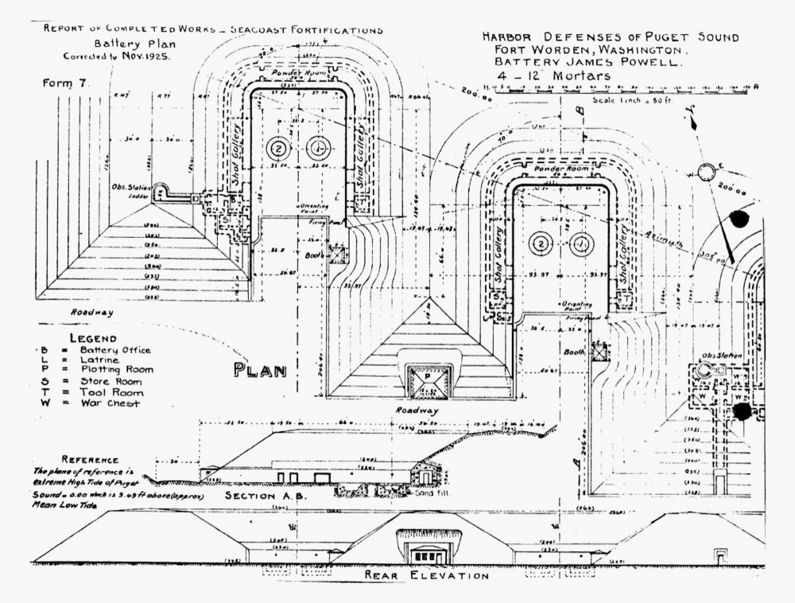Battery Powell (1)
|
Battery Powell (1) (1902-1942) - Battery James Powell is a concrete Endicott Period mortar battery located on Fort Worden, Jefferson County, Washington. Named in G.O. 194, 27 Dec 1904, after Major James E. Powell, 25th Missouri Volunteers, (Captain 1st U.S. Infantry) who was killed in action on 6 Apr 1862 at the Battle of Shiloh during the U.S. Civil War. The Battery was begun in 1899, completed in 1901, and transferred to the Coast Artillery for use on 16 Jun 1902 at a total cost of $81,051.06. The mortars were dismounted in 1942 during World War II.
 
HistoryPart of the Harbor Defense of Puget Sound. Designed to protect both the Straight of Juan De Fuca and the Admiralty Inlet to Puget Sound. This Battery and Battery Brannan originally was built as one large mortar battery housing sixteen 12" M1890MI mortars on M1896MI carriages in a concrete battery with four mortar pits (A-D). The original battery was split into two batteries in 1908, mortar pits A and B became Battery Brannan and pits C and D became Battery Powell (1). Each of the mortars was capable of firing a seven hundred pound shell nine miles and proved accurate enough to hit a moving practice target seven miles away in 1913. The plotting room for Battery Powell was located between mortar pits A & B in a separate building along the access road. An observation post was located at the top of the Battery on the left flank of pit B. Inside the walls of each pit is a "U" shaped corridor that was used to house the mortar projectiles and the separate powder bags used to propel them. Between Battery Powell (1) and Battery Brannan was an underground complex that had various uses over the years but that was meant to contain the "war chest" of fuse materials for arming the projectiles. At the right rear of each mortar pit was a concrete "booth" that was used to communicate with the spotters and the plotting room and to relay the azimuth and elevation firing information to the gunners. In May 1918 two mortars were removed from each pit leaving two mortars remaining in each pit. The mortars were removed because it proved difficult to load and fire four large mortars simultaneously and there was a requirement for mortars in the World War I European theater. Even with the removal of two mortars from each pit the rate of fire did not significantly drop. The mortars were prepared for shipment and transported on U.S. Barge #5 towed by the U.S. Steamer Wilson to Seattle with the intent of shipping them to the war zone in Europe. This shipment arrived in Seattle on 30 May 1918 with sixteen 12" mortars, two mortars from each mortar pit of the following batteries:
The four remaining mortars were removed in 1942, during World War II.

Current StatusPart of the Fort Worden State Park Conference Center. The Battery is accessible to the public and the rooms are clean and dry but empty. The top of the battery is very overgrown making it difficult to access the observation posts. No guns or carriages are in place.
Sources:
Links: References:
Fortification ID:
Visited: 17 Jun 2009, 19 Jul 2008 Picture Gallery
| |||||||||||||||||||||||||||||||||||||||||||||||||||||||||||||||||||||||||||||||||||||||||||||||||||||||

